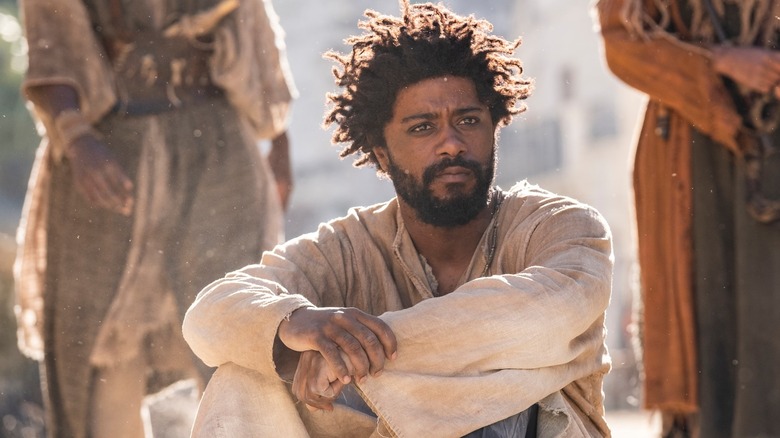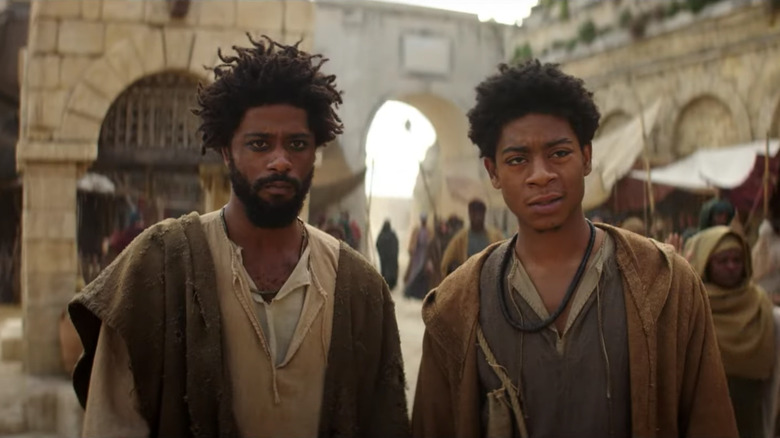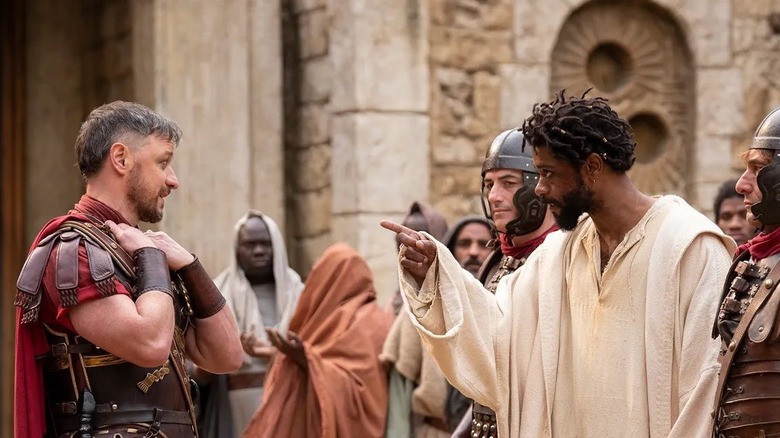The Book Of Clarence Review: A New Way To Tell The Greatest Story Ever Told
Jeymes Samuel, aka The Bullitts, directed a Western in 2021 called "The Harder They Fall," which took the names of real post-Civil War cowboys and gunslingers and put them into a highly stylized, highly fictionalized adventure story that was exhilarating to watch and refreshingly complex. What Samuel seemed to be doing was reclaiming the Western genre from the hands of boors like John Wayne and his associated "white savior" stories that, for many Hollywood generations, deliberately ignored the Black experience.
Samuel now takes a similar approach to the Hollywood Biblical epic with "The Book of Clarence," an exciting, ambitious, sloppy, but somewhat excellent New Testament remix, replete with a mishmash of tones, anachronisms, and interesting ideas. "Clarence" sees Jerusalem in AD 33 as the setting of a modern crime drama, wherein the title character (LaKeith Stanfield) interacts with a slap-happy John the Baptist (David Oyelowo), his own bitter twin brother Thomas the Apostle (also Stanfield), the immortal gladiator Brabbas (Omar Sy), and the Man Himself, Jesus Christ (Nicholas Pinnock). Just as classic Hollywood frequently cast white actors as Judean, Jewish, and Middle Eastern historical figures (Charlton Heston? Really?), Samuel aims to redress the balance somewhat by casting almost Black actors exclusively. Only a few Romans are played by white actors (Pontius Pilate is played by James McAvoy), and there is a certain cameo I will leave for you to discover.
Overall, "Clarence" is wild and tonally scattered, but one cannot fault a film for being a little sloppy when it's clearly eager to present as much as this one does; "too many ideas" is a problem, I think, we should all hope to have. There is a lot to wrestle with in "Clarence," but also a lot to enjoy.
A new way to tell the Greatest Story Ever Told
"Clarence" is about doubt and faith, atheism and holiness, greed and forgiveness. It has portions that feel hard and pointed, and other scenes that are slapstick and farcical. It can be somber, bitter, beatific, and silly in turns. There is a high-octane sword fight sequence followed by a sneaky con man's speech. Samuel is so eager to spill out all his Biblical ideas, Christian criticisms, notions of honor and holiness, and jokey Mel Brooks-like modern-day jokes (characters speak in modern English) that he stumbles a little and drops a few threads. But Samuel's excitement is so contagious, one remains utterly fascinated throughout.
Stanfield plays the titular would-be gospel-writer Clarence, a low-level criminal in AD 33. In this world, Jesus and the Apostles are local celebrities whom Clarence considers to be frauds; he is an atheist who doesn't believe in miracles and considers this whole Jesus thing to be a long con of some kind. Clarence owes a great deal of money to a local crime boss Jedediah (Eric Kofi-Abrefa), and initially hopes to become the 13th apostle to gain some prestige and pay off his debts. This goes afoul, however, as he still resents his twin brother Thomas for joining Jesus right when their mother (Marianne Jean-Baptiste) was ailing in bed. Clarence manages to get a blessing from John the Baptist, but this John slaps him across the face for being such a disrespectful scoundrel.
Clarence eventually aims to become a Messiah himself, only as a means of enriching himself and his friends; he is accompanied everywhere by his best friend Elijah (R.J. Cyler).
Faith vs. reason
For the film's early scenes, the filmmakers are keen on confronting the exclusive nature of a Christian philosophy that otherwise claims to be inclusive. Clarence regularly says out loud that knowledge is superior to belief, and that God seems horrifyingly stingy when it comes to suffering in the world. Indeed, his knowledge-first sermons present a palpable counter-philosophy to Christianity, looked up with suspicion. At the same time, "Clarence" never questions Christ's divinity, careful to present Jerusalem as a melting pot of ideas.
This, in a movie that also begins with a comedic chariot race with Mary Magdalene (Teyana Taylor), and contains a sequence wherein a gladiatorial slave owner (Babs Olusanmokun) stages an amazing swordfight between Clarence and Barabbas. Oh yes, and there's a romantic subplot involving Clarence's would-be paramour (Anna Diop) and a comedically skeptical scene wherein Clarence talks to Mary (Alfre Woodard) about her son. As mentioned, a lot happens in the film's 129 minutes.
Anyone who has seen "Monty Python's Life of Brian" or Mel Brooks' "History of the World" movies might have an easy time adjusting to Samuel's tone for "The Book of Clarence," and may also sense where it is ultimately going with both its satire and its story. Samuel aims to pay homage to Hollywood biblical epics while also exploding and dissecting them. Ultimately, the filmmakers have constructed a teetering scaffold out of the scattered, dissected pieces of Hollywood's bloated Biblical 1950s and 1960s claptrap. They might have been able to build a towering pointed essay, but the act of dissection itself is, in this case, exhilarating to behold.
"The Book of Clarence" is aspirational, unique, moving, funny, weird, and very shaggy. But it's better to have a picture's cup runneth over than to present us with an empty chalice.
/Film Rating 7 out of 10


